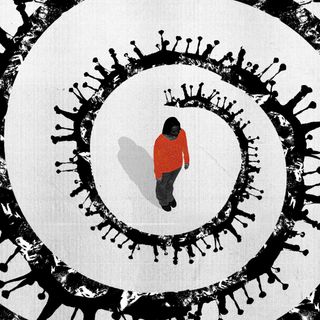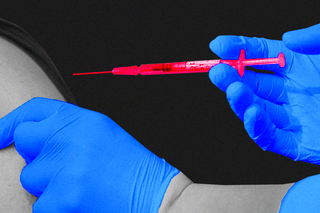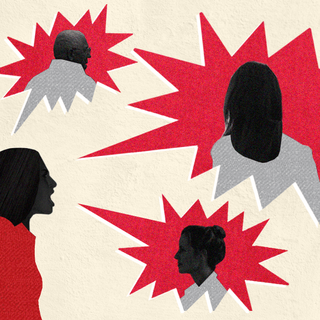
Omicron Fears Lead to a Rise in Unauthorized Booster Shots
Experts say relying on doses and not taking accompanying precautions like masking could prove detrimental to health policy.

There’s very little we understand about Omicron, but the devastating impact a potential third wave could have is something people are vaguely familiar with. As cases spike across the country (as of Monday morning, more than 100 cases were identified in India), people are reportedly taking illegal third doses at privatehospitals. In one instance, a businessman took a shot of Sputnik after taking two scheduled doses of Covishield and Covaxin, according to the Times of India.
“Health experts said that many in Delhi have taken one booster dose after completing the vaccination process,” the report added.
The panic-driven pattern is concerning for multiple reasons. One, there is no proof thatthe current vaccines provide equally effective protection against Omicron as compared to previous variants.
Second, research (which is yet to be peer-reviewed, but offers a glimpse into the severity of the infection) has shown the Omicron variant evades immune protection conferred by vaccines and natural infection. Some note the importance of designing vaccines according to the variant specifications.
A handful of studies (based on laboratory response and not from the individual response to real-world conditions) released since Omicron’s detection point out that the vaccines may not completely prevent Covid19 infection from the highly contagious strain — despite helping curtail its severity in general. “…only the Pfizer and Moderna shots, when reinforced by a booster, appear to have initial success at stopping infections, and these vaccines are unavailable in most of the world,” the New York Times noted.
This is because both Pfizer and Moderna are based on mRNA technology, which has previously offered significant protection against variants. Other vaccines, like Covishied, Covaxin, Sputnik, rely on using a mechanism that triggers the immune response.“An mRNA vaccine delivers the instructions for making a viral protein to our cells. The process is different from other vaccines like Covishield, which uses the adenoviral vector technology to trigger an immune response using a modified version of a different virus,” The Swaddle explained previously.
In either case, opting for the booster shot — by furtive means — could thusaccelerate a false sense of security. Experts have reiterated the importance of precautions like social distancing, wearing masks, and regular sanitizing — but counting only on booster shots and flouting other norms may have serious public health ramifications.
“Misinformed people are taking a booster dose, and it’s happening mostly because hospitals and companies want to get rid of their stocks before it expires,” Dr. Sanjay Rai, professor, department of community medicine, All India Institute of Medical Sciences (AIIMS) told TOI.
Related on The Swaddle:
Omicron Variant Did Not ‘Originate’ in South Africa, It Was ‘Detected’ There. The Difference Matters
Secondly, India hasn’t decided on a policy about booster shots. The Indian SARS-CoV-2 Consortium on Genomics (INSACOG) earlier this month called for more scientific data to gauge the need for an additional dose. So far health workers and other essential workers are on the list to get a booster shot, but the policy for the general population is still undecided, and taking an extra dose under the table is illegal and deleterious to the whole process.
Currently, the prevailing idea is India has a high vaccination coverage (which may not be true for rural and tribal areas) and that Omicron does not cause serious illness. The noted symptoms so far are fatigue, sniffles, cold. But this may amplify a sense of complacency.
“We have to get people to understand that it doesn’t work like that: If you get high transmissibility you’re going to have the health system saturated because the number of people getting ill will be higher,” Mario Rosemblatt, a professor of immunology at the University of Chile, told New York Times. As of now, experts have cautioned a prospective third wave in India early next year.
Before we get there, theidea is to maximize current two-dose vaccination coverage. On December 8th, the World Health Organization saidcountries should not wait for evidence on Omicron’s transmissibility, immune escape potential, and the severity of the disease — and immediately increase coverage among those most at risk.
The impact of Omicron and the resultant vaccine efficacy is unknown. But the current discourse about variant precautions and booster doses will determine how we respond to future similar threats. Professor Salim Abdool Karim, a former head of the South African Ministerial Advisory Committee on Covid-19, put forward some foreboding insights: Omicron isunlikely to be the last major mutation of the coronavirus to spread around the world. Before we see the virus finally unable to mutate any longer, we may see other variantsover the next two to three years.
As Dr. Saumitra Das, director of the National Institute of Biomedical Genomics, noted: “At this stage, three things can save us. Wearing a proper well-fitted mask, avoiding crowded areas, and complete vaccination.”
Saumya Kalia is an Associate Editor at The Swaddle. Her journalism and writing explore issues of social justice, digital sub-cultures, media ecosystem, literature, and memory as they cut across socio-cultural periods. You can reach her at @Saumya_Kalia.
Related


The Science Behind Why People Are Unkind to Those They Love
